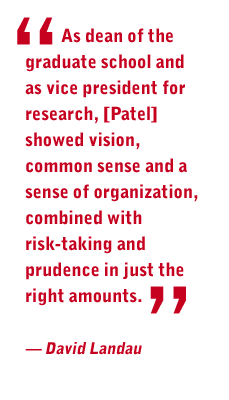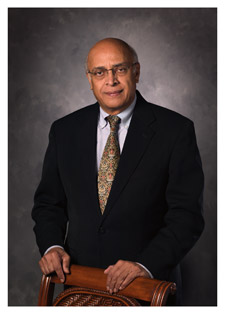


Research Spotlight: Gordhan Patel
by Tack Cornelius
Page 1
| Page 2


After five years as UGA’s vice president for research
and associate provost, Gordhan Patel retired Aug. 1, 2005. Under his leadership, external funding for UGA research programs grew 30 percent. Construction of the Paul D. Coverdell Center for the Biomedical Health Sciences will soon be completed and major renovation of the Animal Health Research Center (see sidebar on page 20) will be dedicated in April 2006.In conventional wisdom,intelligence is the most important trait for scientists — sheer brainpower. But Gordhan L. Patel puts a different essential trait at the top of his list: curiosity.
“If you’re not curious, you won’t ask the questions ‘why’ and ‘how,’” he said. “You just accept things. The history of science is the history of people asking these questions.”
Curiosity’s cousin — imagination — also ranks high on Patel’s list of traits a scientist needs: the ability to see new links between things or, on a grander scale, to see the world in new ways, as did his intellectual heroes, Newton, Darwin and Einstein.

Photo: Robert Newcomb
After five years as UGA’s vice president for research and associate provost, Gordhan Patel retired Aug. 1, 2005. Under his leadership, external funding for UGA research programs grew 30 percent. Construction of the Paul D. Coverdell Center for the Biomedical Health Sciences will soon be completed and major renovation of the Animal Health Research Center (see related sidebar http://www.researchmagazine.uga.edu/fall2005/facilitysidebar.htm) will be dedicated in April 2006.
For 38 years, Patel’s own curiosity and imagination have animated his work at the University of Georgia. He arrived in 1967 as an assistant professor of zoology and retired Aug. 1, 2005, a distinguished teacher, researcher and administrator.
“Gordhan has been foremost an exceptional and effective leader, whether as a faculty colleague, department head, dean or vice president,” said Joe Crim, associate vice president for instruction. “He is universally respected.”
David Landau, Distinguished Research Professor in physics and director of the Center for Simulational Physics, echoed that appraisal.
“As dean of the graduate school and as vice president for research, he showed vision, common sense and a sense of organization, combined with risk-taking and prudence in just the right amounts. Besides this, he is a fascinating guy to talk to,” Landau said.
Even as Patel was face to face with retirement and, at last, some leisure, his continuing enthusiasm for his work poured out in conversation. Asked about the general focus of his research, his straightforward answer — “the biochemistry of the cell nucleus” — could not dam up the teacher and researcher in him. “The nucleus is the head office where you have all the blueprints, all the plans you need,” he said. “In the human case, each cell has six linear feet of DNA. Think about the architectural challenge of packaging six feet of double- stranded DNA into that microscopic nucleus.”
From there he was off and running along the Watson and Crick strands of the double helix, describing how the strands “unwind” and are positioned for replication, gene expression and much more.
The same passion came through as he talked about objectivity in research.
“I always tell students, ‘Remember, you’re testing the hypothesis; you’re not proving the hypothesis. Don’t look at results and say, “This result does not fit my hypothesis.” Ask, what is the result telling me?’ It may be telling you that your hypothesis is wrong,” he said.
Sometimes it can take decades to verify a hypothesis.
In the ’70s, Patel purified a protein that facilitates the unwinding of the DNA double helix, this unwinding being a necessary step for replicating and transcribing genes. In a 1985 paper published in the Proceedings of the National Academy of Sciences, he and his collaborators postulated that, during evolution, some proteins may have been recruited for more than one function. This past spring investigators at Johns Hopkins University published a review of research reported during the past 20 years that strongly supports that 1985 prediction.
Patel actually grew up wanting to be a physician, prompted by his parents and admiration for Albert Schweitzer: “You cannot grow up in Africa without hearing about Schweitzer,” he said.
Page 1 | Page 2
For comments or for information please e-mail: rcomm@uga.edu
To contact the webmaster please email: ovprweb@uga.edu
![]()